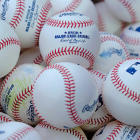Earlier this spring, Major League Baseball agreed to partake in a vast and unique study on the viability of COVID-19 antibody testing, and on Sunday the league reportedly received preliminary test results.
According to Jeff Passan of ESPN, 60 of the 5,754 subjects tested showed the presence of COVID-19 antibodies. After adjusting to reflect testing accuracy, that comes to a positive test rate of 0.7 percent. As Passan notes that's a lower figure than other notable antibody test studies have yielded. Furthermore, 70 percent of those who tested positive were asymptomatic -- i.e., they presented no symptoms of having COVID-19. The tests were conducted in the middle of April.
The goal of the study is to determine the extent of the coronavirus pandemic in large metropolitan areas. It's a joint effort on the part of Stanford University, the University of Southern California, and the Sports Medicine Research and Testing Laboratory. "I think this kind of testing, the MLB study that we're doing, is the start and not the end point. I would like this kind of testing to be done everywhere," Dr. Jay Bhattacharya of Stanford told CBS Sports at the time the testing program was announced. "Every community needs to know what the right next steps need to take from a local approach, and to open the economy, this is the right step."
Unlike the current COVID-19 test that must be performed by healthcare professionals, the antibody test used in the MLB study can be administered at home and yield results within minutes. Presently, it can take up to a week to receive results from the COVID-19 test.
The results of the antibody study likely won't have any bearing on when or if MLB begins the 2020 regular season. At last report, MLB was hoping to start in early July and play roughly 80 games in the regular season followed by an expanded playoffs.


















